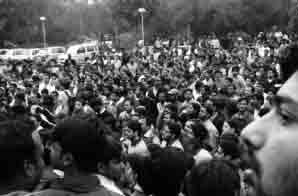Making calculated use of the Supreme Court stay (based on the Lyngdoh Committee’s recommendations) on the JNUSU elections, the JNU Administration had bypassed the JNUSU (now led by the AISA) to push through measures like hiking of the Prospectus fee by 67%, razing down trees and flattening out the ecologically-sensitive area of Parthasarathy Rock area in order to make it available for shooting of films and advertisements on a commercial basis, installing individual meters in hostel rooms with plans to levy ‘user charges’ on students for electricity, and violations of modalities for implementation of OBC reservations. More than 2000 students turned out in massive protests – forcing the Administration to withdraw some of the measures like the renting out of PSR rocks and user charges for electricity.
But on the issue of hike in the prospectus price, the Administration remained adamant. However, to maintain the pretence of being ‘pro-poor’, the JNU Administration proposed a clause that applicants from Below Poverty Line [BPL] families could avail the prospectus free of cost - a piece of tokenism that amounts to 100% subsidy for 0% applicants, when it is well known that availing a BPL certificate is a process fraught with many problems, and there is no adequate data on the extent to which such families are able to avail education, let alone enter the realm of higher education and apply for a JNU prospectus. As a symbolic response to the closing down of dialogue by the Administration, the JNU students’ union closed down one of the admission counters. Within a few hours of this symbolic protest, the Administration responded by rusticating the JNUSU leaders and other activists. This provoked outraged protest within and beyond JNU – with intellectuals like Anil Sadgopal, Yogendra Yadav, activists like Swami Agnivesh and many others rallying actively to the students’ support and taking up the issue with the JNU Cancellor Prof. Yashpal and with the HRD Minister Arjun Singh.

9 students then went on indefinite hunger strike, which they eventually withdrew on the 8th day, in response to an appeal by the JNU Teachers’ Association, which had firmly demanded that the Administration revoke the rustications and initiate dialogue with students on the pending issues. However, the Admin. remained adamant even after the hunger strike was withdrawn, until sustained pressure from the teaching community, a Committee was set up to review the rustications. The Committee recommended withdrawal of the rustications – and eventually after over a week’s delay, the rustications were eventually withdrawn.
This is the second time that this particular JNU Administration has had to roll back rustications of Students’ union leaders and Left activists. The first occasion was in 2007 when students who protested against violation of workers’ minimum wages were victimised.
Meanwhile, another ripple effect of the JNU struggle beyond JNU gates has been that the University Grants Commission (UGC) has issued a circular to all Universities with the intention of centrally regulating the “exploitative” cost of prospectuses. A newspaper, which linked the circular to the issues raised by JNU students, quoted a “top UGC official” as saying, “A high prospectus fee can block the entry of a prospective student even before he seeks admission. It is an entry-level road block which must be removed” – the same point that the JNU movement was making. (see Telegraph, March 17)